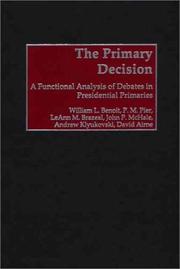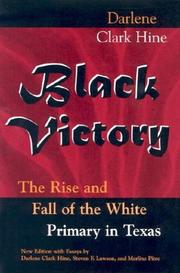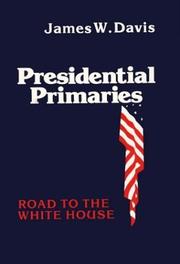| Listing 1 - 10 of 18 | << page >> |
Sort by
|
Book
ISBN: 0511030371 Year: 2002 Publisher: Cambridge : Cambridge University Press,
Abstract | Keywords | Export | Availability | Bookmark
 Loading...
Loading...Choose an application
- Reference Manager
- EndNote
- RefWorks (Direct export to RefWorks)
Rejecting conventional accounts of how American political parties differ from those in other democracies, this text focuses on the introduction of the direct primary and argues that primaries resulted from a process of party institutionalization initiated by party elites.
Primaries --- Politics and Government. --- Direct primaries --- Elections, Primary --- Presidential primaries --- Primary elections --- Elections --- Nominations for office

ISBN: 9780313073557 0313073554 0275974405 9780275974404 Year: 2002 Publisher: Westport, Conn. Praeger
Abstract | Keywords | Export | Availability | Bookmark
 Loading...
Loading...Choose an application
- Reference Manager
- EndNote
- RefWorks (Direct export to RefWorks)
Primaries --- Campaign debates --- Presidents --- Direct primaries --- Elections, Primary --- Presidential primaries --- Primary elections --- Elections --- Nominations for office --- Election. --- Election
Book
ISBN: 1108368883 110837266X 1108355803 1108420990 1108413102 Year: 2018 Publisher: Cambridge, England : Cambridge University Press,
Abstract | Keywords | Export | Availability | Bookmark
 Loading...
Loading...Choose an application
- Reference Manager
- EndNote
- RefWorks (Direct export to RefWorks)
Primary elections were supposed to limit the influence of party bosses on the nomination process. The decision to run for House or Senate and a candidate's success in securing the party's nomination for these offices has been considered to be largely candidate-centered. In The Party's Primary, Hans J. G. Hassell shows that parties have a strong influence on the options available to voters and shape the outcomes of the nomination process. Drawing on interviews with party insiders and candidates, Hassell highlights the resources that parties have at their disposal that are not readily available outside the party network and the process by which party elites coordinate behind preferred candidates. Using data from almost 3000 nomination contests for House and Senate in the past decade, this book shows that parties use these tools to clear the field for their preferred candidate and exert a strong influence on the outcomes of primary elections.
Primaries --- Direct primaries --- Elections, Primary --- Presidential primaries --- Primary elections --- Elections --- Nominations for office --- United States. --- Elections. --- Political parties
Book
ISBN: 1643360531 9781643360539 9781643360515 1643360515 1643360523 9781643360522 Year: 2019 Publisher: South Carolina
Abstract | Keywords | Export | Availability | Bookmark
 Loading...
Loading...Choose an application
- Reference Manager
- EndNote
- RefWorks (Direct export to RefWorks)
"Every four years presidential hopefuls and the national media travel the primary election circuit through Iowa and New Hampshire. Once the dust settles in these states, the nation's focus turns to South Carolina, the first primary in the delegate-rich South. Historically Iowa and New Hampshire have dominated the news because they are first, not because of their predictive ability or representativeness. In First in the South, H. Gibbs Knotts and Jordan M. Ragusa make the case for shifting the national focus to South Carolina because of its clarifying and often-predictive role in selecting presidential nominees for both the Republican and Democratic Parties. To establish the foundation for their claim, Knotts and Ragusa begin with an introduction to the fundamentals of South Carolina's primary. They then detail how South Carolina achieved its coveted "First in the South" status and examine the increasing importance of this primary since the first contest in 1980. Throughout the book they answer key questions about the Palmetto State's process, using both qualitative information--press reports, primary sources, archival documents, and oral histories--and quantitative data--election results, census data, and exit polls. Through their research Knotts and Ragusa argue that a key factor that makes the South Carolina primary so important is the unique demographic makeup of the state's Democratic and Republican electorates. Knotts and Ragusa also identify major factors that have bolstered candidates' campaigns and propelled them to victory in South Carolina.While the evidence confirms the conventional wisdom about endorsements, race, and being from a southern state, their analysis offers hope to political newcomers and candidates who raise less money than their competitors. Succinct and accessible, First in the South is a glimpse behind the curtain of the often-mysterious presidential primary process."--Provided by vendor.
Primaries --- Presidents --- Political campaigns --- Nomination of presidents --- Nominations for office --- Direct primaries --- Elections, Primary --- Presidential primaries --- Primary elections --- Elections --- Nomination. --- United States --- Politics and government. --- Government --- History, Political
Book
ISBN: 1139946536 1316998738 1108666248 1107080592 1107440157 Year: 2019 Publisher: Cambridge, England : Cambridge University Press,
Abstract | Keywords | Export | Availability | Bookmark
 Loading...
Loading...Choose an application
- Reference Manager
- EndNote
- RefWorks (Direct export to RefWorks)
The direct primary stands as one of the most significant and distinctive political reforms of the Progressive era in American history. In this book, the authors provide the most comprehensive treatment available on the topic and utilize new data on election outcomes, candidate backgrounds, incumbent performance and behavior, newspaper endorsements, and voters' preferences. They begin by studying whether primary elections have achieved the goals set by progressive reformers when they were first introduced over a century ago. They then evaluate the key roles these elections have played in the US electoral systems, such as injecting electoral competition into the regions that are dominated by one of the two major parties, helping select relatively qualified candidates for office, and, in some cases, holding incumbents accountable for their performance. They conclude with studying the degree to which primaries are responsible for the current, highly polarized environment. Anyone interested in US primary elections, US political history, or electoral institutions more generally should read this book.
Primaries --- Elections --- Political candidates --- Political participation --- Candidates, Political --- Nominees, Political --- Political nominees --- Politicians --- Direct primaries --- Elections, Primary --- Presidential primaries --- Primary elections --- Nominations for office --- Primaries.
Book
ISBN: 1108851665 1108768377 1108487955 1108861644 Year: 2020 Publisher: Cambridge : Cambridge University Press,
Abstract | Keywords | Export | Availability | Bookmark
 Loading...
Loading...Choose an application
- Reference Manager
- EndNote
- RefWorks (Direct export to RefWorks)
Legislative solutions to pressing problems like balancing the budget, climate change, and poverty usually require compromise. Yet national, state, and local legislators often reject compromise proposals that would move policy in their preferred direction. Why do legislators reject such agreements? This engaging and relevant investigation into how politicians think reveals that legislators refuse compromise - and exacerbate gridlock - because they fear punishment from voters in primary elections. Prioritizing these electoral interests can lead lawmakers to act in ways that hurt their policy interests and also overlook the broader electorate's preferences by representing only a subset of voters with rigid positions. With their solution-oriented approach, Anderson, Butler, and Harbridge-Yong demonstrate that improving the likelihood of legislative compromise may require moving negotiations outside of the public spotlight. Highlighting key electoral motives underlying polarization, this book is an excellent resource for scholars and students studying Congress, American politics, public policy, and political behavior.
Government productivity --- Primaries --- Voting --- Direct primaries --- Elections, Primary --- Presidential primaries --- Primary elections --- Elections --- Nominations for office --- United States. --- History. --- United States --- Politics and government. --- Government --- History, Political
Book
ISBN: 0226012700 Year: 1980 Publisher: Chicago (Ill.): University of Chicago press
Abstract | Keywords | Export | Availability | Bookmark
 Loading...
Loading...Choose an application
- Reference Manager
- EndNote
- RefWorks (Direct export to RefWorks)
#SBIB:324H42 --- #SBIB:328H31 --- Politieke structuren: verkiezingen --- Instellingen en beleid: VSA / USA --- Presidents --- Primaries --- Nomination. --- Direct primaries --- Elections, Primary --- Presidential primaries --- Primary elections --- Nomination of presidents --- Nomination --- Elections --- Nominations for office

ISBN: 0826263682 9780826263681 9780826214621 0826214622 0826214622 Year: 2003 Publisher: Columbia, Mo. University of Missouri Press
Abstract | Keywords | Export | Availability | Bookmark
 Loading...
Loading...Choose an application
- Reference Manager
- EndNote
- RefWorks (Direct export to RefWorks)
African Americans --- Primaries --- Direct primaries --- Elections, Primary --- Presidential primaries --- Primary elections --- Elections --- Nominations for office --- Afro-Americans --- Black Americans --- Colored people (United States) --- Negroes --- Africans --- Ethnology --- Blacks --- Suffrage --- History. --- Black people

ISBN: 0313220573 Year: 1980 Volume: no. 41 Publisher: Westport, Conn. Greenwood Press
Abstract | Keywords | Export | Availability | Bookmark
 Loading...
Loading...Choose an application
- Reference Manager
- EndNote
- RefWorks (Direct export to RefWorks)
Primaries --- Presidents --- Elections primaires --- Présidents --- Election --- -Primaries --- -342.82 <73> --- 342.511.1 <73> --- 324 <73> --- Direct primaries --- Elections, Primary --- Presidential primaries --- Primary elections --- Elections --- Nominations for office --- Presidency --- Heads of state --- Executive power --- Présidents --- United States --- 342.82 <73> --- ETATS-UNIS --- SYSTEMES POLITIQUES --- INSTITUTIONS POLITIQUES --- ELECTIONS PARTICULIERES --- PARTIS POLITIQUES

ISBN: 9786612762468 128276246X 0520935772 1597349836 0520228340 0520228332 9780520935778 1417508256 9781417508259 9780520228337 9780520228344 9781597349833 6612762462 9781282762466 Year: 2002 Publisher: Berkeley : University of California Press,
Abstract | Keywords | Export | Availability | Bookmark
 Loading...
Loading...Choose an application
- Reference Manager
- EndNote
- RefWorks (Direct export to RefWorks)
California's adoption of the blanket primary in 1996 presented a unique natural experiment on the impact that election rules have on politics. Billed as a measure that would increase voter participation and end ideological polarization, Proposition 198 placed California voters once again on the frontier of political reform. Employing a variety of data sources and methodologies, the contributors to Voting at the Political Fault Line apply their wide-ranging expertise to understand how this change in political institutions affected electoral behavior and outcomes. This authoritative study analyzes the consequences of California's experiment with the blanket primary, including the incidence of, motivations behind, and persistence of crossover voting; the behavior of candidates and donors; the effects on candidate positions and party platforms; and the consequences for women, minorities, and minor-party candidates. Published in association with the Institute of Governmental Studies, University of California, Berkeley
California. --- Primaries. --- Primaries-- California. --- Political Rights - U.S. --- Government - U.S. --- Law, Politics & Government --- Primaries --- Direct primaries --- Elections, Primary --- Presidential primaries --- Primary elections --- Elections --- Nominations for office --- american history. --- american politics. --- california history. --- california. --- elections. --- electoral college. --- government. --- political party. --- political primaries. --- political science. --- political. --- politics. --- presidential primary. --- primary elections. --- united states history. --- us history. --- voter. --- voting. --- west coast. --- western states. --- western united states.
| Listing 1 - 10 of 18 | << page >> |
Sort by
|

 Search
Search Feedback
Feedback About UniCat
About UniCat  Help
Help News
News